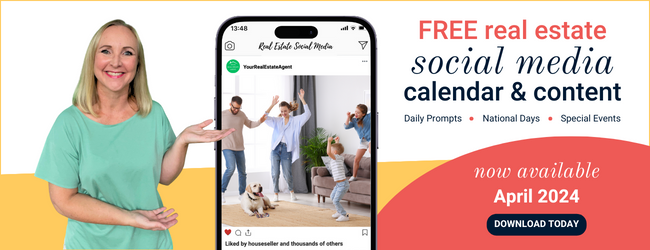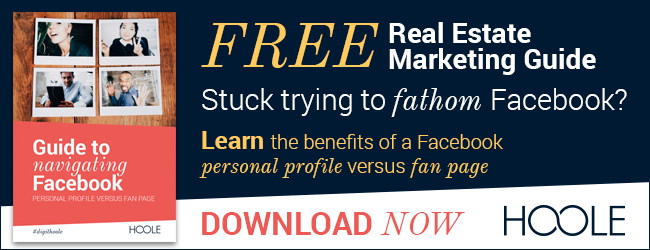For many years, Facebook has been walking a fine line, trying to balance the needs of its users with the expectations of its paying advertisers. Now, as concerns about data protection hit the headlines, Facebook’s having to revisit its business model. But what does this mean for real estate marketing?
Why is the Facebook algorithm changing?
Everyone’s talking about Facebook – and not necessarily in a good way. The social media platform has had a huge amount of negative press recently. Whether it’s research showing that it has detrimental effects on mental health, or revelations about potential misuse of users’ data, it seems that Facebook just isn’t getting it right.
Users have become so concerned about these issues that the company’s share price has dropped dramatically. There has even been a #DeleteFacebook campaign across social media.
The big problem for Facebook is that it has been trying to balance the needs of two opposing groups of customers:
1. Facebook users who get the service for “free” (in return for giving up personal data), and
2. The advertisers who contribute over 95 percent of Facebook’s revenue.
It’s a dilemma I can identify with, as I used to work for the real estate portal Domain.com.au. We faced a daily challenge of trying to make the property search experience pleasurable and rewarding for buyers and renters, while still catering for the advertising needs of real estate agents and their clients.
Facebook is an endlessly bigger concern, and the implications of its business decisions are huge. This is why, in the face of so much user dissatisfaction, steps need to be taken to put things right for the user.
Is the sky falling in for Facebook advertisers?
The recent revelations and resulting backlash have led Mark Zuckerberg to take out full-page ads in 10 newspapers in the US and the UK, apologising and promising to rectify the situation.
But can he really be expected to take all the blame for the ways his platform has moved further and further away from its original purpose of connecting people? Or are we, as advertisers and business people, acting like Chicken Little when we say the sky is falling in, expecting “the king” to solve the problem?

As Mari Smith says, “When the marketers come the members leave.” Perhaps we need to take some of the responsibility for the way the Facebook experience has changed for users, and realise that in a way, we have brought the current uncertainty on ourselves by being unable to resist such a fertile customer base.
“When the marketers come the members leave.” – Mari Smith
Now, as a result, Facebook is changing for real estate marketing. But before we start talking about Facebook Armageddon and panicking unnecessarily, we have to take a look at what’s actually changing at Facebook, and what it’s likely to mean for your real estate business.
What Facebook newsfeed changes are being made?
Facebook wants to see a return to more meaningful interactions between people using the platform. This is why the Facebook algorithm is changing the way content is prioritised in the newsfeed in a number of ways:
1. The visibility of content from pages will decrease
The newsfeed is now prioritising content from your friends and family, so content from brand pages you follow will be less visible.
This change is user-led. As Mark Zuckerberg explains in a post announcing the changes, “Recently, we’ve gotten feedback from our community that public content – posts from businesses, brands and media – is crowding out the personal moments that lead us to connect more with each other.”
Facebook expects that business pages may see a decrease in their reach and referral traffic as a result, especially if they post content that doesn’t generate much interaction.
2. Content that promotes more interaction will get priority
Facebook is responding to concerns stemming from academic research on this one. Studies show that when people use Facebook passively, scrolling through and reading content without interacting with it, this can have negative effects on mental health. When people are more active and interact with people’s content in meaningful ways, this is a far more positive and connective experience.
So the Facebook algorithm will start prioritising content that receives meaningful interactions such as longer, more in-depth comments and conversations. Again, brand content is likely to suffer.
3. Partner Categories are being removed
Due to the current concerns surrounding user privacy and data protection, Facebook is shutting down Partner Categories. If you use these in your real estate marketing, you’ll know that they enable you to target users based on information Facebook receives from third parties about their online behaviour outside Facebook.
This has serious implications for real estate marketing. If you currently rely on advertising categories such as “Likely to move”, or whether users own or rent their homes, you’re likely to see these disappear altogether this year.
How can your real estate social media marketing adapt to these changes?
It’s not all doom and gloom for brand pages. Your followers can still use the “See First in News Feed” option if they want to see your content as a priority. Many users won’t be aware of this so there’s no harm in spreading the word! (And please feel free to use this option for my page, so you never have to miss a free tip again!)
However, the most meaningful, in-depth conversations are often not had in comments on the newsfeed, but in Facebook Groups and on Facebook Messenger. Facebook itself is encouraging this, so it’s worth exploring these options and getting more involved in conversations.
Also, make sure you’re building your own database and making your own meaningful connections on Facebook. User data is only going to become more difficult to come by so it’s time to stop relying on it. In fact, Facebook has now taken away the ability to search for contacts using their mobile number or email address in the Facebook search bar. This was something I advised all my clients to as part of the open home contact call backs. Good news is that there are more strategies available to overcome this loss that relate to making better use of advertising audiences.
There is also the option of having a public profile for professional reasons as well as a brand page, so you can talk to more people in your community as a real estate agent. This is something the team at Hoole.co can help with as part of our social media profile services for real estate agents.
Please keep in mind, though, that these changes make it more difficult than ever to receive the reach you need through organic posts. If you’re serious about using Facebook as a real estate marketing tool, you need to pay to play.

What changes should you be making to your content?
It’s now more important than ever to post quality content that’s likely to receive meaningful interactions. Click bait and overly-promotional content are being penalised – so it’s time to think carefully about what you’re posting and whether or not local home sellers and property investors will find it interesting and useful.
“Make sure you’re not reliant on just one social media platform or digital marketing tool.”
Live video is an effective form of content – on average, it receives more than six times the engagement of other video content. But don’t make every post from your page a live video. Users will quickly tire of it if brands overuse it, and Facebook will kill it in response.
You need to decide on the best way to deliver each message. This could be via text post, visual post, animated gif, website link, pre-recorded video or live video. Then decide the best place to post that message, such as:
- Which social media channel
- On your personal profile or your professional one
- On your business page
- In a Group or on Messenger
It could even be that a combination of these is the right approach.
Change is always inevitable. It’s the way you deal with it that matters. Don’t panic. Have a plan. Make sure you’re not reliant on just one social media platform or digital marketing tool. And always keep talking to your target audience, person to person. It’s this level of personal interaction that will make you stand out in an increasingly impersonal world.


Join the Conversation - add your thoughts